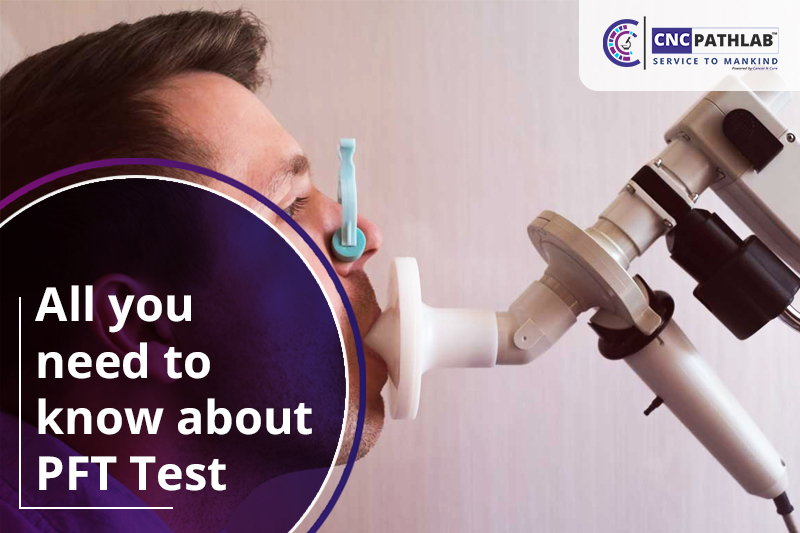All you need to know about PFT Test
The PFT Test is an examination used to assess the health and efficiency of your lungs. The lung function test is another name for them. PFT stands for Pulmonary Function Test in its full form. These tests can tell you if you have any breathing problems or if your lungs are adequately supplying oxygen to every cell in your body. Patients with respiratory disorders or those suspected of having respiratory problems must undergo testing like lung cancer diagnostic tests or PFTs for asthma.
What do you mean by lung function test or PFT test?
If you're unsure of what a PFT test is, here's a brief explanation: it's a noninvasive test that not only diagnoses lung disorders but also aids in selecting the appropriate course of therapy. PFT contains many exams that check how well the lungs are working. These examinations reveal the health and dimensions of the small and large airways, as well as the pulmonary parenchyma and capillary bed. They function well as a test for lung infections.
PFT spirometry is the simplest test of all. This PFT test process evaluates the lungs' capacity to keep air as well as their capacity to expel air with power. PFTs also contain lung capacity tests that aid in determining lung volume, airflow, and gas exchange as well as lung size.
Read also: Female Infertility: Why this happens?
PFTs are not just for those with lung or respiratory conditions; healthy individuals can also have these tests as part of a regular health examination. People who work in coal mines and graphite factories should have PFTs because their work environment puts them at a higher risk of developing respiratory issues.
Types of PFT Test
A pulmonary function test consists of measurements and diagnostic techniques that can determine how well your lungs are working and how much room they have. The following types of PFTs exist:
-
Spirometry
To determine your breathing capacity—the amount of air you can inhale and exhale at once—this might be referred to as a simple and straightforward breathing test. The doctor will ask you to breathe slowly, quickly, and generally at various points during the breathing test to determine whether you are having any breathing difficulties or not. You will be given a sensor (PFT machine) and a tube to use for the breathing test.
-
Gas exchange test
This test is carried out to determine the maximum amount of oxygen that can be transferred from your lungs' air sacs to your blood. In order to assess various lung problems, your doctor may ask you to momentarily hold your breath while also breathing deeply.
-
Lung volumes test
When you breathe in various ways throughout this test, the amount of gas in your lungs is measured. A PFT device that is utilised for this test is a plethysmograph. You will be requested to sit comfortably at a location during this exam, breathe in and out, and occasionally you may also be required to pant. This test is particularly effective in identifying restrictive lung diseases like pulmonary fibrosis and obstructive lung diseases like asthma (lung function test for asthma).
-
Others
DLCO (Diffusing capacity of the lungs for carbon monoxide) test, maximal voluntary ventilation test, oxygen titration test, inspiratory and expiratory muscle pressure test, methacholine challenge test, six-minute walk test, compliance testing, impulse oscillation test, fractional exhaled nitric oxide test, cardiopulmonary exercise test, and high altitude simulation test are some additional tests that are a part of PFTs. All of these lung function tests are essential to perform in order to identify lung cancer, asthma, or COPD, but they also provide a very accurate and clear diagnosis that enables medical professionals to figure out what is wrong with your respiratory system and the precise location of your symptoms.
When to take a PFT Test?
- If you have symptoms of any respiratory disorder or a lung infection.
- If you are going to have treatment or surgery related to the lungs. At that time, PFTs are recommended to check the actual condition of your lungs and other respiratory organs.
- If you are working or living in an environment with a lot of air pollution then surely doctors will recommend you to have PFT as your routine health checkup as such a situation makes you more prone to lung problems.
- If you are suffering from Chronic Obstructive Pulmonary Disease or Asthma then to monitor the duration and effect of these problems, your doctor may recommend you to undergo through PFT test.
Read also: What do you need to know about the Complete blood count (CBC) test?
What happens in PFT test Delhi?
These examinations are completely painless and safe. They are performed by a skilled pulmonary technician who makes you blow and breathe as forcefully as you can. To guarantee the correctness of the results, tests are repeated several times. For the exercise test, which is typically done on a bike or treadmill, you might want to wear loose-fitting, comfortable clothing and sports shoes. During the exam, your vital signs will be monitored via a blood pressure and cardiac monitor. When you make an appointment for the PFT exam, you will be given more details on how to prepare for it.
What is the PFT test cost in Delhi?
PFT test price range depending on the type of test performed.
So get your PFT test from reputated diagnostic laboratory CNC Pathlab


.jpg)


.jpg)
